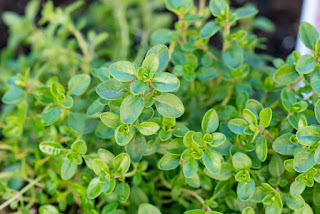What is thyme good for?
What is thyme good for?
2. Medicinal Uses:
Thyme contains compounds with potential health benefits, including antimicrobial and anti-inflammatory properties. It has been used traditionally to treat respiratory conditions, such as coughs and bronchitis, and to soothe sore throats.
3. Aromatherapy:
Thyme essential oil is used in aromatherapy for its calming and stress-relieving properties.
4. Antioxidant Properties:
Thyme is a good source of antioxidants, which can help protect cells from oxidative damage.
5. Preservative:
Thyme's antimicrobial properties can also be used as a natural food preservative.
6. Herbal Tea:
Thyme can be brewed into a tea, which may offer various health benefits, including aiding digestion and boosting the immune system.
Please note that while thyme can be a valuable addition to your culinary and wellness routines, it should not replace medical treatment for specific health conditions. Always consult with a healthcare professional for any health concerns.
Certainly, here are some additional uses and benefits of thyme:
7. Skin Care:
Thyme can be used topically in skincare products due to its antibacterial and antifungal properties. It may help treat acne and other skin issues.
8. Respiratory Health:
Thyme is often included in herbal remedies for respiratory issues like congestion and coughs. Inhaling thyme steam or using it in herbal preparations may provide relief.
9. Digestive Aid:
Thyme has been traditionally used to aid digestion and alleviate digestive discomfort. Thyme tea or incorporating thyme into your meals can support digestive health.
10. Anti-Inflammatory:
Thyme contains compounds like carvacrol, which have anti-inflammatory properties and may help reduce inflammation in the body.
11. Hair Health:
Thyme oil is sometimes used in hair products for its potential to promote hair growth and combat dandruff.
12. Antiseptic:
Thyme's natural antiseptic properties make it useful for cleaning wounds and promoting wound healing.
Remember that while thyme offers many potential benefits, individual responses may vary. It's important to use thyme in moderation and consider any allergies or sensitivities you may have. If you're using thyme for medicinal purposes, it's advisable to consult with a healthcare professional for personalized guidance.
conclusion,
Thyme is a versatile herb with a wide range of culinary and potential medicinal uses. From enhancing the flavor of dishes to its potential health benefits, including antimicrobial, anti-inflammatory, and digestive properties, thyme can be a valuable addition to your kitchen and wellness routine. Whether you're using it in cooking, as an herbal remedy, or for skincare, it's important to enjoy thyme in moderation and consider individual sensitivities. As with any herbal remedy, it's wise to consult with a healthcare professional for specific health concerns or if you plan to use thyme as a natural remedy.



0 Comments